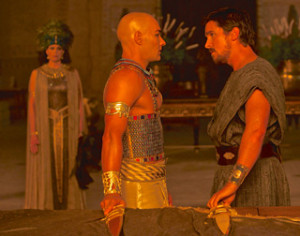By Dwight Brown NNPA Film Critic
“Exodus: Movement of Jah people! Oh-oh-oh, yea-eah!” chants Bob Marley. In his rousing three-minute song “Exodus” he presents a more strong and spiritual feel for Moses than Ridley Scott’s 154-minute, whitewashed sword-and-sandals epic.
Travel from the north to the south of Egypt and there is a variance of skin color, tan to black. Now, and certainly 3,300 years ago during the time of Moses, the population never looked Anglo. Anyone who has been inside a tomb and viewed paintings of ancient Egyptians sees painted skin that looks brown. Not white. The chances of Egyptian pharaohs and their queens looking like Australians or Italians, is minute. This 2015, historically revisionist glimpse of Egypt with its racial population shift should be greeted with skepticism before the opening credits roll.
Exodus: Gods and Kings skips over the strong visual of a Hebrew baby floating in a basket on the Nile. Instead, a grown-up Moses (Christian Bale) has a testy love/hate relationship with his weaker stepbrother Ramses (Joel Edgerton, an Australian who starred in The Great Gatsby). Ramses father Pharaoh Seti (John Turturro, an Italian American, O Brother, Where Art Thou?) has assessed the situation: in a heated battle with enemy forces (The Hittites), if you want to win, you’d choose to be in Moses’ battalion, not Ramses’. Seti favors Moses, and Ramses can feel it.
Within minutes, Moses is portrayed as a fighter, an accomplished swordsman; confident and unapproachable. Screenwriters Adam Cooper, Bill Collage, Jeffrey Caine and Steven Zaillian make him bigger than life. He’s a Robin Hood, a Ben Hur, a gladiator. It’s a persona meant to attract adventure fans to the theater, along with the curious faith-based crowd. Some will find the big screen hero they crave; others might be wary of the grouchy activist they meet. Many will feel something intangible is missing.
Moses life takes a turn when he visits a region run by Viceroy Hegep (Ben Mendelsohn, Australian, The Dark Knight Rises) who treats his Hebrew slaves unmercifully and is stealing money from Seti. Nun (Ben Kinglsey), a Hebrew scholar and leader of the slaves, discloses a hidden truth; that the visiting royalty is not the son of Seti’s sister Bithiah (Hiam Abbass, The Visitor), he is not Egyptian and that as an infant he was saved from the slaughter of Hebrew newborns. Basically, Nun is saying, “Dude, you’re a Jew.” And not just any Hebrew, you’re a savior. Moses laughs it off, but holds that thought. Sometime later, Seti dies. Ramses takes over. Moses true identity is exposed and he is exiled. But oh yes, he returns.
Scott’s interpretation of what happens next includes a God that appears in the body of a British boy (Isaac Andrews, Hercules), plagues and pestilences that make Ebola look like a sore throat, and Moses returning from a sojourn starting a grassroots gorilla terrorist movement that leads hundreds of thousands of CGI (Computer Generated Imagery) Hebrews across the Red Sea to safety in the Promised Land. And yes, if you studied the Bible, Torah or Quran, you know that the Red Sea has its own special effects department.
Scott’s Gladiator movie was a huge spectacle built around huge events. The sheer weight of that over-the-top, lavish production did not shroud that story, it embellished it. Pity the director only has one gear. Over-drive. His skill-set overwhelms what should have been a simple, spiritual story about a humble man accomplishing a heroic feat. All Scott’s Exodus is missing is Siegfried & Roy, Macy’s July Fireworks and someone being shot out of a cannon. Mel Gibson’s brutal The Passion of the Christ, regardless of the criticism it deserved, felt authentic. Scott’s soulless direction/production does not.
Bale is one of the best actors of his generation. His role in the Batman film The Dark Knight is iconic. In 3:10 to Yuma and Rescue Dawn, he proved he could tone his characters down to blend in to smaller productions. He’s a brilliant thespian. However, his Moses is a sullen and aloof man who is never compelling. Edgerton, who is dripping in self-tanning lotion, is more convincing as the selfish Pharaoh. John Turturro is totally miscast as Seti and should go back to Brooklyn. Sigourney Weaver, cast as Ramses conniving mom Tuya and Seti’s first wife, looks like a white witch and not an Egyptian Queen. Ben Mendelsohn’s portrayal of the sexually ambivalent Hegep is better fit for a daytime soap opera. Dar Salim, as Ramses’ Commander Khyan, is the only one cast in a major supporting role that looks like he was born within 500 miles of Cairo.
The cinematography (Dariusz Wolski, Prometheus) is crystal clear and colors pop off the screen. The costumes by Oscar-winning designer Janty Yates (Gladiator) are opulent. The special effects look obvious: A handful of extras posing as 400,000 Hebrews headed for a dip in the Red Sea look very digitally enhanced. The parting of the sea resembles a big tidal wave in Hawaii, and not the way you’d imagined it to look. The over-the-top 3-D spectacle makes arrows fly by your head. War scenes on the level of those in Lord of the Rings erupt. The one saving grace is perhaps the rousing, ultimate chase scene; Egyptians pursing the Hebrews.
It’s disconcerting that Anglo-looking actors got top roles in this film and people of color were regulated to extra parts. But that isn’t this film’s biggest transgression. Scott and his tech crew have concocted a bombastic production centered on a mythical man that is a prophet in Judaism, Christianity and Islam. When audiences leave the theater they will likely remember the blockbuster battle scenes and not the nuances of the man behind the legend.
This film, like Bob Marley’s “Exodus,” needed a spiritual feel. It has none.
Visit NNPA Syndication Film Critic Dwight Brown at DwightBrownInk.com
